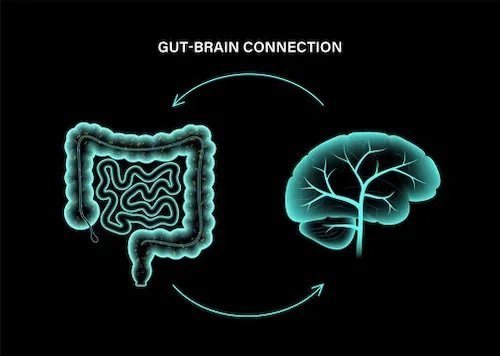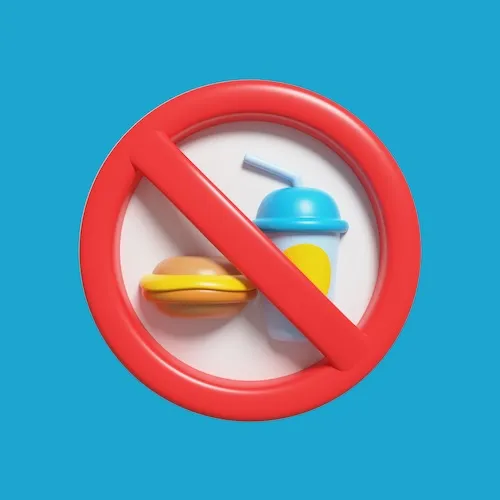Have you ever noticed how your mood seems to crash after that “healthy” smoothie bowl?
Or why you feel jittery and on-edge despite following the latest clean eating trend?
You’re not imagining it – the way we eat can have a massive impact on the way we feel and think. It’s a cycle that can easily spiral into a vicious cycle of anxiety and unhealthy eating habits.
As a social impact platform focused on holistic wellness, we’re seeing a troubling pattern: As people become more health-conscious, they paradoxically experience increased anxiety about their food choices. The numbers are striking: 68% of Americans report feeling anxious about their eating habits, while 73% say they’re confused about “healthy eating.”
The real issue? We’re so focused on counting calories and tracking macros that we’ve lost touch with how food actually makes us feel. In our social impact community, members frequently share their struggles:
“I’m eating all the ‘right’ things, but I feel worse than ever.”
“My ‘clean’ diet makes me obsess over every bite.”
“I can’t tell if my anxiety is causing my food issues or if it’s the other way around.”
The truth is, your diet could be contributing to your anxiety in ways you never expected. As we’ve discussed on our blog and our mental health podcast, the gut-brain connection is far more powerful than previously thought – and the foods we eat can either calm or chaos our minds.
But here’s what’s really interesting: it’s not just about what you eat, but how you eat it. As a platform for social impact, we’re witnessing a revolution in understanding the relationship between food, mood, and mental wellness. The solution isn’t another restrictive diet or complicated meal plan – it’s about creating a mindful, sustainable approach to nourishing both your body and mind.
Let’s spend some time exploring the hidden connections between your plate and your mental state, and show you how to build a relationship with food that supports your emotional wellbeing. No more anxiety-inducing food rules – just practical, science-backed strategies for feeling your best.
The Gut-Brain Axis: Your Second Brain
The concept of “trusting your gut” just got a lot more scientific. Recent research has revealed that your digestive system contains a complex network of neurons that’s so sophisticated, scientists call it the “second brain.”
This enteric nervous system doesn’t just digest food – it plays a crucial role in your mental health. This “gut-brain axis” involves a constant, bidirectional communication system including:
- The vagus nerve, which serves as a direct communication highway
- Neurotransmitters, including 90% of your body’s serotonin, produced in the gut
- The microbiome, trillions of bacteria that influence brain function
- Inflammatory markers that can affect mood and cognitive function
Pretty impressive, right? While we may assume that our brain is solely responsible for our thoughts and emotions, it turns out that the gut plays a major role as well.
The Microbiome’s Mental Health Impact
Within your gut lives an incredible ecosystem of bacteria, fungi, and other microorganisms known as the microbiome. These tiny organisms play a pivotal role in digestion, nutrient absorption, and immune system function. Every choice we make with what goes into our bodies impacts our body’s response:
- Influence anxiety and depression levels
- Affect stress response
- Impact cognitive function
- Modulate emotional behavior
On our mental health podcast, leading researchers have discussed how an imbalanced microbiome can contribute to:
- Increased anxiety
- Mood swings
- Brain fog
- Sleep disruption
The Science of Food and Mood
A healthy approach to nutrition focuses on understanding this crucial connection. When we don’t prioritize our gut health, we are more susceptible to mental health issues:
- Processed foods can increase inflammation, potentially leading to anxiety and depression
- A Mediterranean-style diet rich in whole foods is associated with a 33% lower risk of anxiety
- Fermented foods may help reduce social anxiety
- High-sugar diets can impair the body’s stress response
As a social impact community, we believe this understanding is crucial for holistic wellness. The gut-brain axis isn’t just another health buzzword – it’s a scientifically validated framework for understanding how our food choices directly impact our mental wellbeing.
Diet Culture’s Mental Health Toll: When “Healthy” Becomes Harmful
The rise of restrictive eating trends has created an unexpected side effect: increasing levels of food-related anxiety. Research continues to show that strict dieting can trigger several significant physiological and psychological changes – some of which can do more damage than good.
What Is The Physical Impact of Restrictive Dieting?
Heightened Cortisol Levels
When we restrict food intake or follow rigid eating patterns, our bodies interpret this as a form of stress.
Dieters often report having consistently higher levels of cortisol, the primary stress hormone. This elevation can persist for months after dieting begins, creating a chronic stress response that affects both physical and mental health.
Increased Anxiety Symptoms
Restrictive eating patterns create a biological cascade that amplifies anxiety.
Science indicates that caloric restriction alters neurotransmitter production, particularly serotonin and GABA – key modulators of anxiety and mood. Plus, all of that constant worry about food choices and calorie counting creates a cognitive load that can manifest as persistent anxiety symptoms.
Disrupted Sleep Patterns
Diet-induced hormonal changes can play a huge role in our quality of sleep. And when your sleep struggles, so does your overall well-being.
Studies show that restrictive eating can:
- Reduce melatonin production
- Interrupt natural sleep-wake cycles
- Increase nighttime wakefulness
- Decrease overall sleep quality These disruptions create a vicious cycle, as poor sleep further impacts hunger hormones and anxiety levels.
Impaired Cognitive Function
Restricting food intake directly affects brain performance. While you may find that short, intermmitent periods of fasting can have temporary cognitive benefits, prolonged calorie restriction can lead to brain fog, decreased concentration and memory, and impaired decision-making abilities.
The cognitive impact often gets misattributed to other factors, when in reality, it’s a direct result of restrictive eating patterns.
The Psychology of Restriction
Orthorexia: The Clean Eating Obsession
Orthorexia, while not officially recognized as an eating disorder, represents an unhealthy fixation with “righteous” eating. This condition develops when the pursuit of healthy eating becomes an all-consuming obsession that actually damages physical and mental wellbeing. Signs include:
- Compulsive checking of ingredient lists
- Inability to eat food prepared by others
- Extreme anxiety about food quality
- Self-punishment for food “transgressions”
Dysregulated Hunger Cues
Strict dieting disrupts our body’s natural ability to regulate hunger and fullness. This disconnection manifests as:
- Loss of natural hunger signals
- Difficulty recognizing fullness
- Extreme hunger followed by overeating
- Anxiety around physical hunger sensations
Anytime you begin to notice these patterns in your own eating behaviors, it is important to seek support and address the root causes of disordered eating. Remember, healthy eating is about balance and moderation, not strict rules and restrictions.
Social Isolation Through Food Rules
Rigid eating patterns often lead to social withdrawal. It may seem that our eating patterns and our social lives are two separate entities, but they are in fact closely intertwined. Restrictive diets can lead to:
- Avoiding social gatherings involving food
- Inability to eat at restaurants
- Strained relationships due to food restrictions
- Missing important social connections and experiences
Chronic Stress Around Food Choices
The constant mental burden of food decisions creates ongoing stress in our lives. Do you often find yourself feeling stressed or anxious around meal times? This can be a result of:
- Continuous calorie calculations
- Anxiety about upcoming meals
- Fear of breaking diet rules
- Persistent guilt around eating
These psychological impacts create a foundation for long-term anxiety that extends far beyond just food choices, affecting overall quality of life and mental well-being.
Finding A Balanced Approach to Nutrition and Mental Health
As a social impact platform, we focus on evidence-based approaches that support both physical and emotional well-being. Here’s how to rebuild a healthy relationship with food that supports mental health.
Understanding True Hunger vs. Emotional Eating
Physical hunger develops gradually and can be satisfied with any food. Emotional hunger often comes on suddenly and craves specific foods – causing us to reach for another bit when other internal issues are occurring.
Here are some of the key indicators of physical hunger:
- Gradual onset
- Stomach growling
- Decreased energy
- Ability to wait
- Satisfaction after eating
- No guilt
Do you find yourself feeling these symptoms when you reach for food? If so, it may be true hunger. However, if the following indicators sound more familiar, emotional eating may be the culprit.
Incorporating Mindful Eating Practices
Our mental health podcast series highlights research-backed mindful eating techniques:
The HALT Check: A Simple Tool for Mindful Eating
Before reaching for food, pause and check your HALT status. This evidence-based mindfulness tool helps differentiate between physical and emotional needs.
Hungry? Physical hunger builds gradually, accompanied by clear bodily signals like stomach growling or low energy. If present, eat a balanced meal.
Angry? Anger and frustration can mimic hunger. Stress eating increases cortisol levels and anxiety. Try deep breathing or brief movement instead.
Lonely? Social connection needs often manifest as cravings. Consider calling a friend or engaging in community activities rather than turning to food.
Tired? Fatigue frequently masquerades as hunger. Studies show sleep deprivation increases appetite-stimulating hormones. A short rest may be more beneficial than eating.
By regularly using HALT, you develop stronger awareness of your true needs and can respond appropriately, reducing anxiety around food choices.
Finding Structured Flexibility In Our Diets
Regular Meals, Flexible Timing
Honor hunger cues rather than the clock. Eat at roughly consistent intervals while allowing natural daily variations. This supports stable blood sugar and reduces anxiety around rigid schedules.
Varied Foods, No Restrictions
Include all food groups and allow occasional treats. You don’t want to put stress on yourself to find the “perfect” diet, but rather find what works for your individual needs and preferences.
Relaxed Social Eating
Share meals with others without food rules interfering. According to recent studies, social connections enhance digestion and reduce stress around eating.
Balanced Movement
Exercise for energy and enjoyment, not compensation for food. Focus on how movement makes you feel rather than calories burned. This approach supports both physical and mental well-being.
Practical Strategies for Food-Mood Balance
1. The Power of Protein Timing
Did you know that protein directly impacts neurotransmitter production and mood stability?
When we space our protein intake throughout the day, we create a steady supply of amino acids supporting brain function and reducing anxiety. Studies indicate that individuals who regularly consume adequate protein report fewer anxiety symptoms and more stable energy levels.
- Fish (rich in mood-stabilizing omega-3s)
- Legumes (complex carbs + protein for sustained energy)
- Eggs (complete protein with mood-supporting nutrients)
- Greek yogurt (probiotics + protein for gut-brain health)
- Seeds and nuts (healthy fats + protein + minerals)
2. Blood Sugar Management
Blood sugar fluctuations can trigger anxiety and panic symptoms that mimic mental health issues. When blood sugar crashes, our bodies release stress hormones that can make us feel shaky, irritable, and anxious. Creating a steady glucose rhythm throughout the day helps maintain emotional stability and mental clarity.
- Eat within an hour of waking to stabilize morning cortisol
- Combine carbs with protein/fat to slow glucose release
- Space meals 3-4 hours apart for steady energy
- Keep emergency snacks handy to prevent crashes
3. Mindful Kitchen Setup
Environmental psychology shows that our eating space directly impacts our food choices and stress levels around eating.
A well-organized, intentionally designed kitchen reduces decision fatigue and promotes calm, mindful eating choices. This setup becomes particularly important during high-stress periods when decision-making is already compromised.
4. Meal Planning (Without Rigidity)
Flexible meal planning reduces food anxiety while maintaining structure. Having a loose framework for meals reduces stress around food decisions without triggering restrictive behaviors.
The key is creating a system that bends with your changing needs while providing enough structure to prevent decision overwhelm.
- 3-4 adaptable dinner options weekly
- Mix-and-match breakfast components
- Simple lunch templates that work at home or office
- Several 10-minute backup meal ideas
5. Strategic Snacking
Smart snacking stabilizes blood sugar and supports neurotransmitter production throughout the day. The right snack combinations can prevent anxiety-inducing hunger while providing steady energy for hours. Focus on combinations that include protein, complex carbs, and healthy fats.
- Apple + nut butter (fiber + protein + healthy fats)
- Berries + yogurt (antioxidants + probiotics)
- Hummus + vegetables (protein + fiber + minerals)
- Trail mix with dark chocolate (sustained energy + mood boost)
6. Hydration Habits
Dehydration significantly impacts brain function and can amplify anxiety symptoms. Studies show even mild dehydration affects mood regulation and cognitive performance.
The brain’s stress response becomes heightened when fluid balance is suboptimal, often magnifying you’re already-existing anxiety.
Here are a few daily practices to consider implementing:
- Start with 16oz water upon waking
- Alternate water between meals
- Include herbal teas for variety and calm
- Use simple tracking methods like marked water bottles
7. Social Eating Strategy
Many people experience heightened anxiety around social eating situations. This fear can lead to isolation or disordered eating patterns. Building confidence through gradual exposure helps integrate normal social eating while managing anxiety.
The Power of Community in Sustainable Nutrition
As a social impact platform, we recognize that lasting change happens through connection. Our evidence-based approach combines nutritional science with community support, creating an environment where balanced eating becomes both achievable and sustainable.
Through our mental health podcast and integrated platform features, members gain access to:
- Expert-led nutrition guidance
- Peer support groups for accountability
- Recipe-sharing and meal-planning tools
- Stress-management resources
- Progress tracking without obsession
Our social impact community approach differs by:
- Focusing on well-being over weight
- Celebrating non-scale victories
- Supporting sustainable habits
- Providing 24/7 community connection
- Offering expert-moderated discussions
Join the Movement
Ready to transform your relationship with food and discover the power of community support? AlignUs is building the only community focused on connecting and empowering individuals to create healthy, sustainable lifestyles. With our unique approach, we believe that achieving optimal health is not just about losing weight but also about cultivating a positive mindset and creating long-term habits. Join us today and begin your journey towards a healthier, happier you!




